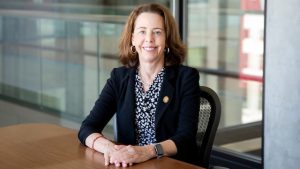Diana Hess, dean of the UW–Madison School of Education, spoke about the value of high-quality teaching about elections in an interview with WKOW’s “Capital City Sunday” last weekend.
As the midterm elections draw nearer and political debates over what teachers can and should talk about in the classroom continue, Hess urged against “turning schools into cauldrons of political polarization.”
“That’s not going to be good for teachers, but it’s not going to be good for kids or the community either,” she said.
Hess acknowledged teaching about politics and elections is more challenging now, amid heightened political polarization, but said it is possible — and essential — to do it well.

“I think some people believe that schools should represent their own political views and so if they learn that young people in schools are learning multiple and competing views, they think there’s something wrong with that,” she said. “But, in fact, we know that’s exactly what should be happening. One of the reasons we have schools in the United States is to prepare people to participate in democracy, and you can’t do that unless you’re helping young people think about multiple and competing ideas.”
A former high school social studies teacher, Hess has spent decades researching how teachers engage their students in discussions of controversial political and constitutional issues. She has authored two award-winning books on the subject and is currently the principal investigator of The Discussion Project, a program backed by the Mellon Foundation aimed at fostering engaging and productive classroom discussions.
Hess said the School of Education, which just hosted the Teaching About the 2022 Elections conference, wants to help educators navigate how to teach something inherently partisan in a nonpartisan way.
“We know that teachers who do that and do that well have a huge effect on young people,” she said. “Young people are more likely to be engaged politically if they learn about elections in school. They’re more likely to be informed voters once they’re old enough to vote.”
The dean also spoke about the teacher shortage in Wisconsin and around the country. She said it is “more serious now than it has been for a long time,” but pointed out the number of students enrolled in UW–Madison education programs is increasing.
Watch Hess’ entire conversation on “Capital City Sunday” here.